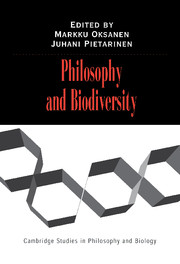Book contents
- Frontmatter
- Contents
- List of Figures and Tables
- List of Contributors
- Acknowledgements
- Philosophy and Biodiversity
- Part I USING ‘BIODIVERSITY’
- Part II UNDERSTANDING BIODIVERSITY
- Part III VALUING BIODIVERSITY
- 6 Jean-Jacques Rousseau
- 7 There Is Biodiversity and Biodiversity
- 8 Evaluating Biodiversity for Conservation
- 9 Limits to Substitutability in Nature Conservation
- Part IV PROTECTING BIODIVERSITY
- Index
- References
9 - Limits to Substitutability in Nature Conservation
Published online by Cambridge University Press: 26 June 2009
- Frontmatter
- Contents
- List of Figures and Tables
- List of Contributors
- Acknowledgements
- Philosophy and Biodiversity
- Part I USING ‘BIODIVERSITY’
- Part II UNDERSTANDING BIODIVERSITY
- Part III VALUING BIODIVERSITY
- 6 Jean-Jacques Rousseau
- 7 There Is Biodiversity and Biodiversity
- 8 Evaluating Biodiversity for Conservation
- 9 Limits to Substitutability in Nature Conservation
- Part IV PROTECTING BIODIVERSITY
- Index
- References
Summary
BIODIVERSITY AND THE “SUBSTITUTION PROBLEM”
Philosophy traditionally deals with concepts and values, either in the spirit of analysis and reconstruction or in the spirit of construction and innovation. In both respects, biodiversity is a “hard case” and a challenge to philosophy's intellectual resources. Like simplicity (a concept which plays a crucial role in the philosophy of science and scientific methodology), diversity is a concept of considerable complexity which easily defies definition. With biodiversity, difficulties multiply because it is not clear what the items are of which biodiversity is predicated. What does it mean to say that a natural system is “diverse,” absolutely or to a certain degree? Does diversity refer to the number and diversity of biological species, to the number and diversity of alleles, or to the diversity of all properties of natural systems including structural, aesthetic, and symbolic properties? The distinction, customary in ecology, between species diversity, ecosystem diversity, and genetic diversity is certainly helpful in this respect, since it shows the essential incompleteness of statements about biodiversity. Nevertheless, an inclusive concept of biodiversity, covering all relevant dimensions, would certainly be desirable.
Similar difficulties beset the attempt to spell out why biodiversity, however defined, is a value and why we should be concerned to preserve or even enhance biodiversity. Is the value of biodiversity extrinsic or intrinsic? “Extrinsic” means that it is valued for its causal role in preserving or enhancing other values, “intrinsic” that it is an end in itself worth pursuing for its own sake.
- Type
- Chapter
- Information
- Philosophy and Biodiversity , pp. 180 - 196Publisher: Cambridge University PressPrint publication year: 2004
References
- 4
- Cited by



